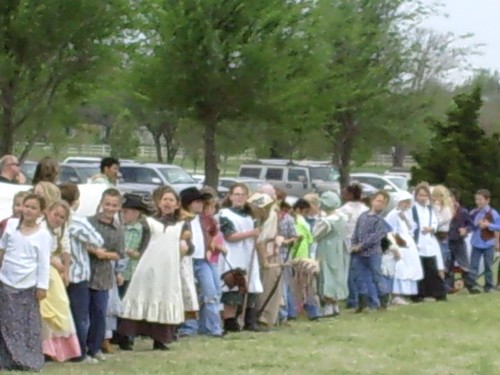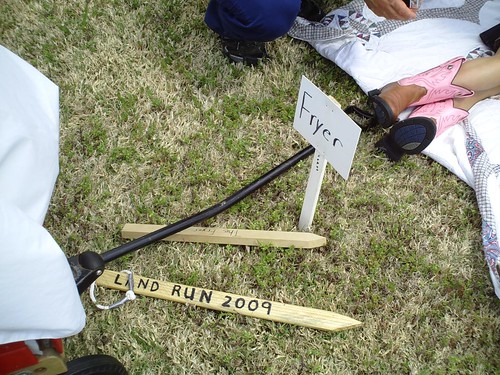Today at the TIC TAC Conference in Tonganoxie, Kansas, I shared a breakout session titled, “Crafting Your Digital Footprint.”
My 9 year old, Sarah, led this session several weeks ago in Maine at the ACTEM09 Conference. Thanks to TWiT Podcast 218, I learned this week (in advance of the session in Tonganoxie) that Google Profiles now officially permit users to assertively take some control over the results displayed when others search for names on Google. This is how my Google profile is shown at the bottom of search results for my name:
I showed and demonstrated this in today’s presentation. According to the Google Profiles website:
What do people see when they find you online? You can control how you appear in Google by creating a personal profile…
Help people find the right information when they search for you on Google.
Create a personal page that links to your blog and other profiles.
Keep family and friends up to date with your contact info and photos.
Google Profiles joins claimid.com and friendfeed.com as free sites which can be used to “stake your virtual claim” in cyberspace for your own digital footprint, similar metaphorically to the ways 3rd graders in many Oklahoma schools “stake claims” as they re-enact the land runs of the late 1800s in the United States.
Both Google Profiles (of course) and Friendfeed are owned and operated by Google. ClaimID is a service catering to online reputation management, defined on WikiPedia as:
…the practice of consistent research and analysis of one’s personal or professional, business or industry reputation as represented by the content across all types of online media. It is also sometimes referred to as online reputation monitoring, maintaining the same acronym.
This is similar to but different from online identity management, defined as:
… online image management or online personal branding or personal reputation management (PRM) is a set of methods for generating a distinguished Web presence of a person on the Internet. That presence could be reflected in any kind of content that refers to the person, including news, participation in blogs and forums, personal web sites, social media presence, pictures, video, etc.
My Google Profile, Friendfeed page, and ClaimID website all contain similar links to sites to which I contribute periodically. Of these, my ClaimID page is the most comprehensive.
Another change from my presentation at ACTEM about “digital footprints” was the use of a video from EduTopia’s Digital Generation Project today. This fantastic video series includes ten videos about diverse youth around the United States who are using digital technologies for fun and learning. I heard Milton Chen talk about and share the Digital Generation Project last week in Hangzhou, China. Today I shared Virginia’s Story with our session participants. These videos are superb to use in sessions like this discussing Internet safety and digital citizenship. Virginia is a student of Vicki Davis in Camilla, Georgia.
I also drew a bit on some slides I’d prepared for librarians in Norman, Oklahoma, on Wednesday, in a session titled, “Digital Citizenship in Libraries: Constructively Leveraging the Power of the Social Web.” The complete Ustream video archive of that 2 hour session is available. During both Wednesday’s presentation for librarians and today’s digital footprint session for Kansas educators, I shared results from the 2008 study “Enhancing Child Safety and Online Technologies” by the Internet Safety Technical Task Force to the Multi-State Working Group on Social Networking of State Attorneys General of the United States. This study, among other things, dispelled several “myths” about social networking and dangers youth face online.
We discussed but did not adequately answer the question, “At what age should students start publishing under their own, full name? We discussed the value of students posting under an “alias” before they are ready to post under their real name online, and then when they reach that stage of readiness “claiming” their aliased online identity to include past digital artifacts in their online, digital portfolio. This was a suggestion made by Ginger Lumen in her May 2009 presentation at PodStock, “Students as Self-Advocates: Why/How Learners Should Craft Their Own Digital Footprints.” In addition to Ginger’s provided wiki resources, a complete audio podcast of that session is also available. On the subject of digital citizenship, I also recommend Robyn Treyvaud’s presentation, “The Natives are Getting Restless: Growing Up and Learning in a Web 2.0 World.” I wish I’d remembered to share the YouTube video, “Digital Dossier” during our session today, as Robyn did in Hong Kong in September. This video speaks very well to our need to proactively monitor and craft our digital footprints.
The August 31, 2009, post “The Social Media Mullet” on Blogging 4 Jobs includes some interesting advice for the percentage of an adult’s digital footprint which should be allocated to professional posts and content relative to personal ones. H/T to MetroTech (OKC) for this link.
Resources from my keynote and both breakout sessions at TIC TAC are available from this link, which I shared via a free SMS business card using Contxts during our opening session in the morning. H/T to Karen Montgomery for sharing Contxts with me months ago. It’s a great way to provide others with a link to your presentation resources and handouts!
Technorati Tags:
google, management, profile, claimid, identity, reputation, sms, contxts






Comments
One response to “Google Profiles, Online Reputation Management, and Digital Footprints”
Thanks for the mention on your site. Funny you should mention the importance of your digital footprint. I was notified by Google Alerts that you had listed my name and website in your post.
Noticed you spoke at a conference in Tonganoxie. Are you from Kansas? I grew up just north of Topeka, KS.
Thanks again!
Jessica Miller-Merrell, SPHR
@blogging4jobs